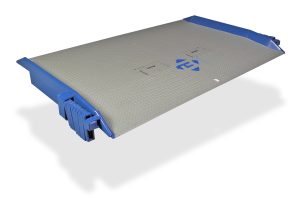
Portable steel railboards (rail boards) are a great solution to bridging the gap between railcars of all types and loading docks. Bluff Manufacturing has been manufacturing railboards for these applications for decades and it seems that no two rail sites are alike. Due to that fact, every railboard built is a custom fabrication for a specific site or set of conditions. There are four major components that provide the parameters for railboard design specifications, they are:
- Capacity of forklifts that will be traveling over the railboard
- Customer’s desired width of the board to service their site
- Railroad track rail-top elevation as it relates to the loading dock surface elevation
- Railroad track distance from the loading dock surface to inside of first rail
It is amazing how much rail sites vary all around the country particularly in relation to #3 and #4. Obviously, no standards or guidelines have been followed in constructing these sites. In many cases involving improper elevations or tracks being too close to the loading dock, less than desirable board designs are forced into service with very steep grades. For those of you involved in designing rail sites to be built with knowledge that portable railboards will be in use, I would submit to you the following ideal track elevations and distances from docks for their use:
Car type Elevation Distance
Standard box car 43″ 74′
Refrigerate box car 49″ 74′
Following these guidelines will permit board designs that when put into service will provide desirable grades for forklift travel.
John Key
Plant Manager and former Plant Engineer
Bluff Manufacturing, Inc.
